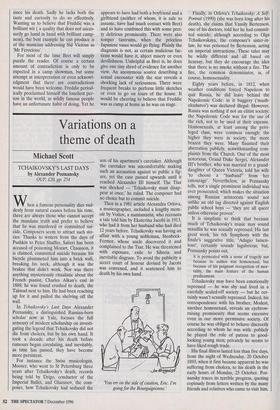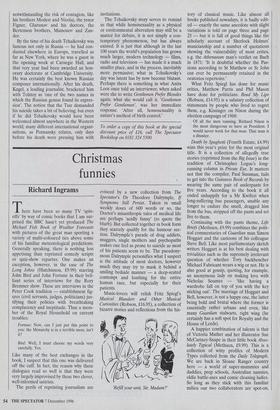Variations on a theme of death
Michael Scott
TCHAIKOVSKY'S LAST DAYS by Alexander Poznansky OUP, £20, pp. 254 When a famous personality dies sud- denly from natural causes before his time, there are always those who cannot accept the mundane truth and prefer to believe that he was murdered or committed sui- cide. Composers seem to attract such sto- ries. Thanks to writers from the days of Pushkin to Peter Shaffer, Salieri has been accused of poisoning Mozart. Chausson, it is claimed, committed suicide because his bicycle plummeted him into a brick wall, breaking his neck, although it was the brakes that didn't work. Nor was there anything mysteriously ritualistic about the French pianist, Charles Alkan's end in 1888; he was found crushed to death, the Talmud next to him. He had been reaching up for it and pulled the shelving off the wall.
In Tchaikovsky's Last Days Alexander Poznansky, a distinguished Russian-born scholar now at Yale, focuses the full armoury of modern scholarship on investi- gating the legend that Tchaikovsky did not die from cholera, but by his own hand. It took a decade after his death before rumours began circulating, and inevitably, as time has passed, they have become more persistent.
For instance the Swiss musicologist, Mooser, who went to St Petersburg three years after Tchaikovsky's death, records being told by Drigo, conductor of the Imperial Ballet, and Glazunov, the com- poser, how Tchaikovsky had seduced the son of his apartment's caretaker. Although the caretaker was uncomfortable making such an accusation against so public a fig- ure, yet the case passed upwards until it reached Alexander III himself. The Tgar was shocked — 'Tchaikovsky must disap- pear at once,' he ruled. The composer had no choice but to commit suicide.
Then in a 1981 article Alexandra Orlova, a musicographer, included a lengthy mem- oir by Voitov, a numismatist, who recounts a tale told him by Ekaterina Jacobi in 1913, who had it from her husband who had died 12 years before. Tchaikovsky was having an affair with a young nobleman, Stenbock- Fermor, whose uncle discovered it and complained to the Tsar. He was threatened with exposure, exile to Siberia and inevitable disgrace. To avoid the publicity a secret court of honour devised by Jacobi was convened, and it sentenced him to death by his own hand.
Tou err on the side of caution, Eric. I'm going for the Bourguignonne.' Finally, in Orlova's Tchaikovsky: A Self- Portrait (1990) (she was born long after his death), she claims that Vassily Bertenson, one of his doctors, told her he had commit- ted suicide; although according to Olga Tchaikovskaya, the composer's sister-in- law, he was poisoned by Bertenson, acting on imperial instructions. These tales may be wildly different and all based on hearsay, but they do encourage the idea that there is no smoke without a fire. The fire, the common denominator, is, of course, homosexuality.
Eighty years before, in 1812, when weather conditions forced Napoleon to quit Russia, he did leave behind the Napoleonic Code: in it buggery ('muzh- elozhstvo') was declared illegal. However, Russia was nothing if not an elitist society; the Napoleonic Code was for the use of the rich, not to be used at their expense. Homosexuals, at least among the privi- leged class, were common enough; the higher they were in society, the more brazen they were. Many flaunted their aberration publicly, notwithstanding com- plaints from the Church. One of the most notorious, Grand Duke Sergei, Alexander III's brother, who was married to a grand- daughter of Queen Victoria, told his wife 'to choose a "husband" from her entourage'. Nevertheless, as Poznansky tells, not a single prominent individual was ever prosecuted; which makes the situation among Russian aristocrats sound not unlike an old tag directed against English public school boys — 'they are all queer unless otherwise proven'.
It is simplistic to think that because much of Tchaikovsky's music may sound maudlin he was sexually repressed. His last great work, his 6th Symphony with the finale's suggestive title, 'Adagio lamen- toso', certainly sounds lugubrious; but, Poznansky points out, it is permeated with a sense of tragedy not because its author was homosexual, but because of his poignant recognition of mor- tality, the main feature of the human predicament.
Tchaikovsky may have been emotionally repressed — he was shy and lived in a carefully sealed-off society — but he cer- tainly wasn't sexually repressed. Indeed, his correspondence with his brother, Modest, another homosexual, reveals an eyebrow- raising promiscuity that seems excessive even in our more permissive society. Of course he was obliged to behave discreetly according to whom he was with: publicly he played the role of patron to good- looking young men; privately he seems to have liked rough trade.
His final illness lasted less than five days, from the night of Wednesday, 20 October 1893, when it first became apparent he was suffering from cholera, to his death in the early hours of Monday, 25 October. Poz- nansky traces its terrible progress, quoting copiously from letters written by the many friends and relatives who came to visit him, notwithstanding the risk of contagion, like his brothers Modest and Nicolai, the tenor Figner, Glazunov and his doctors, the Bertenson brothers, Mamonov and Zan- der.
By the time of his death Tchaikovsky was famous not only in Russia — he had con- ducted elsewhere in Europe, travelled as far as New York, where he was a guest in the opening week at Carnegie Hall, and that very year had been awarded an hon- orary doctorate at Cambridge University. He was certainly the best known Russian composer internationally. After his death, Kugel, a leading journalist, bracketed him with Tolstoy as 'one of the two names in which the Russian genius found its expres- sion'. The notion that the Tsar demanded his suicide takes a bit of believing; but even if he did Tchaikovsky would have been welcomed almost anywhere in the Western world; many different international organi- sations, as Poznansky relates, only days before his death were pressing him with invitations.
The Tchaikovsky story serves to remind us that while homosexuality as a physical or environmental aberration may still be a matter for debate, it is not simply a con- temporary phenomenon, but has always existed. It is just that although in the last 100 years the world's population has grown much larger, modern technology — films, radio and television — has made it a much smaller place, and in the process, inevitably more permissive; what in Tchaikovsky's day was latent has by now become blatant. Perhaps there is something in what Anita Loos once told an interviewer, when asked were she to write Gentlemen Prefer Blondes again, what she would call it. 'Gentlemen Prefer Gentlemen', was her immediate response. 'After all, homosexuality is nature's method of birth control.'
To order a copy of this book at the special discount price of £16, call The Spectator Bookshop on 0181 324 5500.



















































































 Previous page
Previous page